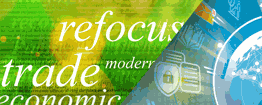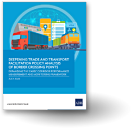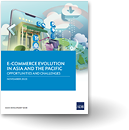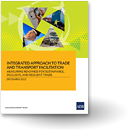Events and Seminars

RCI-POD
WEBINAR
Regional Cooperation and Integration Policy Open Dialogue (RCI-POD) Webinar Series
Co-organized by the Regional Cooperation and Integration Division and RCI Thematic Group, the webinar series aims to provide a venue for casual and open policy dialogue on RCI issues.

Asian Impact is a webinar series that showcases ADB’s research work and informs debate on critical policy issues in Asia. ADB experts, noted academics, frontline policy makers, and others will provide their insights through engaging panel discussions and stimulating research seminars. Join us for an evidence-based exploration of Asia’s continuing economic transformation and the risks that the region faces.

Launch of the Asian Economic Integration Report 2026
This seminar will feature two panel sessions addressing these critical issues. The first session will examine policy options to reinforce regional cooperation and integration as a strategy for mitigating global risks and uncertainties. The second will explore the role of Southeast Asia—one of the most dynamic and fast-growing subregions, characterized by rapidly expanding digital economies, deepening production networks, growing consumer markets, and a pivotal role in regional value chains—in advancing broader cooperation and integration across Asia and the Pacific.

Launch of the Asian Economic Integration Report 2025
The Asian Economic Integration Report 2025 highlights the pivotal role of regional economic integration in Asia and the Pacific’s remarkable growth over the past two decades. The report reveals that Asia’s trade integration is comparable to that of the European Union, with significant advancements in foreign direct investment (FDI) and steady progress in migration, remittances, and tourism.
Globalization has helped deliver remarkable development outcomes for Asia and the Pacific. While it has helped to expand markets, improve resource allocation and enhance productivity, globalization may have also amplified inequalities and accelerated climate change. While digitalization and environmental sustainability are now opening channels for stronger cooperation, geopolitical tensions and evidence of economic fragmentation warrant a rethinking of globalization and the role of regional integration in it.

Streamlining Operational Certification Procedures (OCPs) in Asian FTAs:
The Asian Development Bank (ADB), with the participation of UNCTAD aims to provide a way forward in converging and streamlining PSROS and OCPs in FTAS to Asian and Pacific Governments and regional secretariat such ASEAN and the RCEP. This session will delve into the debate over the best practices for origin certification and OCP management, highlighting the existence of different schools of thought. The goal is to foster a consensus among Asian and Pacific governments to converge on best practices to facilitate trade more effectively across the region.
The Asian Economic Integration Report 2024 analyzes how regional economies in Asia and the Pacific respond to economic and geopolitical challenges by deepening economic inter-relationships. The theme chapter delves into the carbon emissions generated at various stages of global value chains and emphasizes the need for policymakers to address this environmental challenge while maximizing the economic advantages of globalization and global production networks. The report will be launched at the Lee Kuan Yew School of Public Policy of the National University of Singapore on 26 February 2024.

Official Launch of the Asian Economic Integration Report 2023
The Asian Economic Integration Report (AEIR) reviews Asia and the Pacific’s progress on regional cooperation and integration and the states of trade, cross-border investment, financial integration, and the movement of people. According to the 2023 report, integration in the region is progressing steadily and remained stable in 2020 despite the COVID-19 pandemic. This year’s theme chapter, “Trade, Investment, and Climate Change in Asia and the Pacific”, examines how trade and investment, which have been the main driver of the region’s economic growth and industrialization, contribute to climate change, and what policy measures need to be taken to make trade and investment part of climate solutions.
Rapid digitalization amid the COVID-19 pandemic has spurred the growth of digital services trade around the globe. At the forefront is the Asia and Pacific region, demonstrating the highest growth in digital services trade. This book attempts to provide analysis on the opportunities, challenges, and risks associated with trade in digital services that could help inform policy makers in undertaking necessary domestic reforms and pursuing international cooperation.

The IPAF International Conference: Regional Cooperation for Safeguarding Macroeconomic and Financial Stability
The conference brought together government officials from ADB developing member countries (DMCs), representatives from international organizations, research institutes, and business community, and ADB officers and IPAF members to share insights and exchange views on Asia’s financial challenges associated with increased debt levels. The region’s economic outlook is still clouded by the ongoing geopolitical tensions from the Russian invasion of Ukraine and the persisting threat from the COVID-19. These threats may continue to jeopardize the region’s financial stability.
There are different proofs of origin in the Asian region under the CPTPP, the ASEAN 1+ FTAs, the FTAs that some Asian countries have entered with EU and the US, the initiatives under APEC and most recently the ASEAN on electronic certificate of origin, and the RCEP. The drafting complexity of the RCEP’s Article 3.16 on proof of origin with different systems of proof of origin and timetables is revealing of the various schools of thought in this area. This APTFF side event highlights that progress on proof of origin is a concrete trade facilitating measure and will showcase ADB’s work in the area of market access and rules of origin, highlighting the need to identify convergence and best practices in order to undertake the necessary reforms towards a more trade facilitating rules of origin administration in Asia and the Pacific.

10th Asia Pacific Trade Facilitation Forum Week: Next Generation Trade Facilitation for Sustainable Development
The 10th Asia-Pacific Trade Facilitation Forum focused on how trade facilitation should evolve to enhance the resilience of international supply chainsin times of pandemic and to better support sustainable economic recovery and development in the Asia-Pacific region. In this regard, the Forum explored how trade digitalization and emerging technologies can be used to ensure that new generation trade facilitation measures are inclusive and sustainable, enabling effective participation of SMEs and less developed economies in international trade.
The Aid for Trade Global Review 2022, which will take place from 27 to 29 July both in-person and virtually, will discuss the role of Aid for Trade in supporting women’s economic empowerment, digital connectivity, and how environmentally sustainable development can contribute to the desired development outcomes. ADB, in coordination with the World Trade Organization, is organizing two virtual sessions.










